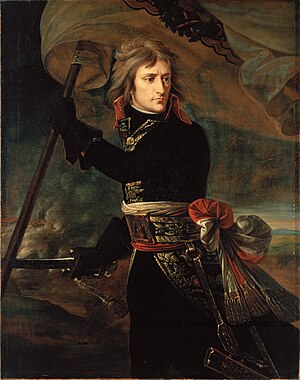Army of Italy (France)
This article needs additional citations for verification. (February 2013) |

The Army of Italy (
History

Bonaparte's reforms
Poorly supplied (uniforms and shoes were rare), and only getting reinforcements irregularly, the Army of Italy was sometimes reduced to looting to survive. When Bonaparte arrived (he took up command on 27 March 1796), indiscipline was rife.
Its first victories improved things – allowing better resupply and easing pay problems through "war contributions" from the conquered lands – but memoirs (though not official communiques) speak of individual or collective failures right up to 1797.
Reserve army
Much of the original Armée d'Italie became the Army of Egypt. Another army, originally called the armée de Réserve, was formed at Dijon on 8 March 1800 (17 ventôse year VIII) and took the title Armée d'Italie on 23 June 1800 (4 messidor year VIII) when it was merged with the remains of the original Armée d'Italie. The new army's first commander was Masséna, followed by Bonaparte (as First Consul and "Commander in person") and général Berthier (its 'Général en chef' from 2 April to 23 June 1800).[1] It was under Berthier that this army beat the Austrians at the Battle of Marengo on 14 June 1800 (25 prairial year 8).[2]
Commanders
- from 7 November to 25 December 1792: General d'Anselme, with neither the title nor the prerogative of a general
- from 26 December 1792 to 9 February 1793, interim: maréchal de camp Brunet
- from 10 February to 4 May 1793: General Biron
- from 5 May to 8 August 1793: General Kellermann
- from 9 August 1793 to 20 November 1794: General du Merbion
- Army before Toulon (Armée devant Toulon):
- from 5 September to 6 November 1793: General Carteaux
- from 7 to 12 November, interim: General La Poype
- from 13 to 15 November, provisionally until the arrival of General Dugommier: General Doppet
- from 16 November to 28 December: General Dugommier with the title of General and commander of the Army of Italy (général en chef de armée d'Italie)
- from 5 September to 6 November 1793: General
- from 29 December 1793 to 21 November 1794: General Pierre Jardat Dumerbion (with Napoleon Bonaparte and Andre Massena as subordinates)
- from 21 November 1794 to 5 May 1795: General Schérer
- from 6 May to 28 September 1795: General Kellermann,[α]commanded the merged Army of Italy and Army of the Alps (armée des Alpes), with the designation of the Army of Italy
- from 29 September 1795 to 26 March 1796: General Schérer, resigned
- from 27 March 1796 to 16 November 1797: General Bonaparte
- from 17 November to 21 December 1797, interim: General Kilmaine
- from 22 December 1797 to 3 April 1798: General Berthier
- from 4 April to 27 July 1798: General Brune
- from 28 July to 18 August 1798, interim: General Gaultier
- from 19 August to 31 October 1798: General Brune
- from 1 November 1798 to 31 January 1799: General armée de Rome). From 11 to 25 December, the army's commander was effectively General Moreau.
- from 1 February to 6 March: General Delmas
- from 7 to 11 March 1799, provisional: General Bruneteto Sainte-Suzanne
- from 12 March to 26 April 1799: General armée de Naples)
- from 27 April to 4 August 1799: General Moreau, as part of his overall command of the Army of Naples
- from 5 to 15 August 1799: General battle of Novi
- from 15 August to 20 September 1799: General Moreau
- from 21 September to 30 December 1799: General Championnet
- from 31 December 1799 to 5 January 1800: General Suchet[α]
- from 6 to 15 January 1800, interim: General Marbot
- from 16 January to 16 June 1800: General Masséna[α]
- from 17 to 24 June 1800, interim: General Suchet
- from 25 June to 21 August 1800: General Masséna
- from 22 August 1800 to 7 March 1801: General Brune[α]
- from 8 March to 27 August 1801, interim: General Moncey[α]
Campaigns and battles
- 21 September 1794 : Bonaparte)
- 24 November 1795 : Benedetto of Savoy, Duke of Chablais
- First Italian Campaign
- Second Italian Campaign
1805–1814
Armée d'Italie participated in the
References
- ^ "The consular magistracy was essentially civil, the principal of the division of powers and of ministers' responsibilities made it undesirable that the first magistrate of the Republic should be immediately in command of an Armée; but no disposition, just as no principle, would oppose that which was present ... As it turned out, the First Consul commanded the armée de réserve, and Berthier, his major général, took the title général en chef." : Memoirs of Napoléon, vol. VI, p. 196
- ^ Alexandre Berthier, Relation de la bataille de Marengo ...; Paris 1805. // Le Capitaine de Cugnac, Campagne de l’armée de Réserve en 1800; Paris 1900
- ^ Napoleon's Italian Campaign 1805–1815. Frederich C. Schneid. 2002. pp. 161–200.[ISBN missing]
Sources
- C. Clerget : Tableaux des armées françaises pendant les guerres de la Révolution (Librairie militaire 1905) ;
